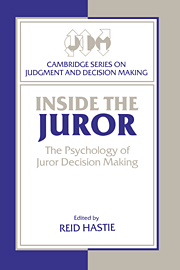Book contents
- Frontmatter
- Contents
- Series preface
- List of contributors
- Editor's preface
- Acknowledgments
- Part I Models of juror decision making
- 1 Introduction
- 2 Some steps between attitudes and verdicts
- 3 The influence of outcome information and attitudes on juror decision making in search and seizure cases
- 4 Algebraic models of juror decision processes
- 5 Stochastic models of juror decision making
- 6 Formal and empirical research on cascaded inference in jurisprudence
- 7 Argument structuring and evidence evaluation
- 8 The story model for juror decision making
- Part II Commentaries
- Index of names
- Index of subjects
8 - The story model for juror decision making
Published online by Cambridge University Press: 04 August 2010
- Frontmatter
- Contents
- Series preface
- List of contributors
- Editor's preface
- Acknowledgments
- Part I Models of juror decision making
- 1 Introduction
- 2 Some steps between attitudes and verdicts
- 3 The influence of outcome information and attitudes on juror decision making in search and seizure cases
- 4 Algebraic models of juror decision processes
- 5 Stochastic models of juror decision making
- 6 Formal and empirical research on cascaded inference in jurisprudence
- 7 Argument structuring and evidence evaluation
- 8 The story model for juror decision making
- Part II Commentaries
- Index of names
- Index of subjects
Summary
Introduction
The goal of our research over the past ten years has been to understand the cognitive strategies that individual jurors use to process trial information in order to make a decision prior to deliberation. We have approached this goal with the perspective of psychologists who are interested in how people think and behave. First, we have developed a theory that we believe describes the cognitive strategies that jurors use. We call this theory the story model, and it is described in the first section of the paper. Second, we have conducted extensive empirical work to test the theory. This work is summarized in the second section of the paper. The story model has been developed in the context of criminal trials, so it will be presented and discussed in those terms. In the final section of the paper, we discuss some of our current research directions.
The story model
We call our theory the story model because we propose that a central cognitive process in juror decision making is story construction (Bennett & Feldman, 1981; Pennington, 1981, 1991; Pennington & Hastie, 1980, 1981a, 1981b, 1986, 1988, 1992). Although story construction is central in our theory and has been the focus of most of our empirical research, it is but one of three processes that we propose.
- Type
- Chapter
- Information
- Inside the JurorThe Psychology of Juror Decision Making, pp. 192 - 222Publisher: Cambridge University PressPrint publication year: 1993
- 163
- Cited by

